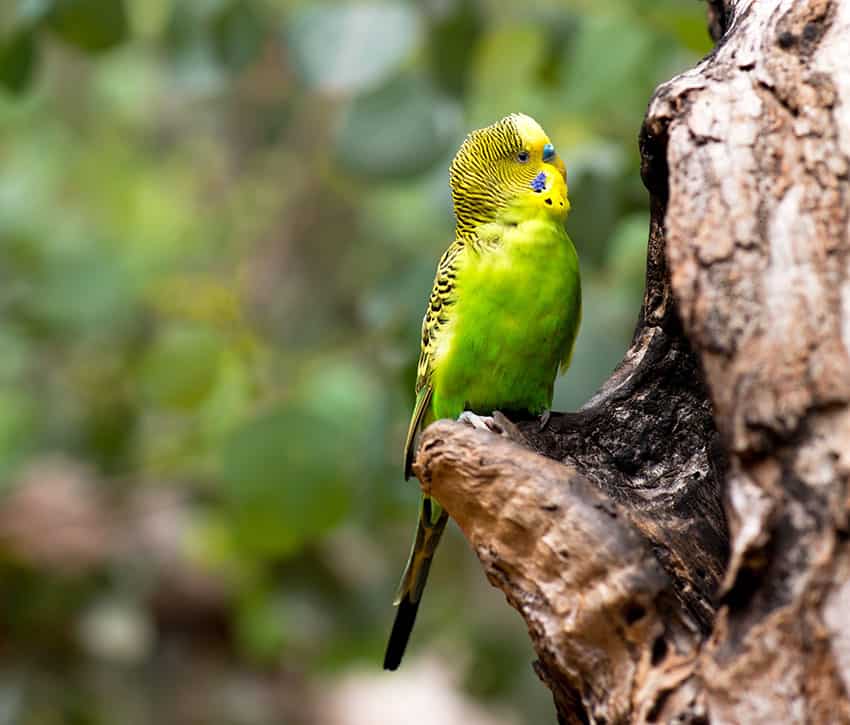Can Parakeets Live Outside in the Wild? Yes, parakeets, specifically the wild species known as budgerigars (Melopsittacus undulatus), are native to Australia and are well-adapted to living in the wild.
In their natural habitat, which includes various regions across Australia, budgerigars thrive in a range of environments such as grasslands, woodlands, and arid scrublands.
They have evolved to survive and thrive in these conditions, where they find food, water, and shelter to meet their needs.
Wild budgerigars have developed various behaviors and adaptations that aid in their survival.
They feed on a variety of grass seeds, which form the primary component of their diet.
They are also adapted to withstand fluctuations in temperature and water availability that are common in their native environment.
However, it’s important to note that domesticated pet parakeets, often referred to as budgies, are not the same as their wild counterparts.
Domesticated budgies have been bred in captivity for generations and may not possess the same survival skills as their wild counterparts.
If released into the wild, domesticated budgies could struggle to find food, water, and suitable shelter, and they might face increased risks from predators and exposure to unfamiliar diseases.
Furthermore, in many parts of the world, releasing non-native species into the wild is discouraged or illegal due to potential ecological impacts on local ecosystems.
If you have a pet budgie and are considering releasing it into the wild, it’s important to understand that doing so might not be in the bird’s best interest and could have negative consequences for the environment.
Instead, if you’re unable to care for your pet budgie, it’s recommended to find responsible alternatives such as rehoming through adoption or contacting avian rescue organizations.

Problems Parakeets Face in the Wild
1. Predators
As small birds, parakeets have a threat to almost every type of animal out there.
This includes predators like big birds, including falcons, kites, hawks, and others.
They are also immune to danger, such as wild cats on the grounds or any fox wandering to search for food.
They survive in such conditions by traveling in flocks to different places.
This makes it tough for any predator to aim and target a single parakeet easily.
2. Temperature
If you have a pet parakeet, it will get the same temperature conditions as you will keep for yourself in the room.
This will most likely keep it protected, but out in the wild, there are different temperature conditions that change after days.
These birds need 65 and 85 degrees Fahrenheit of temperature to stay normal and survive.
If they can’t find a suitable temperature, then they most likely don’t survive outside.
3. Food
Food is a basic need for all animals, including parakeets.
Budgies mostly rely on grains and seeds, but when they are outside, it’s sometimes really hard to find them in some areas, which makes it difficult for them to fill their appetite.
Under these conditions, a parakeet may start to feel low and slow.
This can lead to starvation for a parakeet and even death if a parakeet isn’t able to find the food that he needs.
4. Exhaustion
Parakeets have to fly most of the time in search of food outside.
They move from place to place, and this can tire them easily, and exhaustion will make them slow too.
Such budgies that fly a lot can become disoriented, and they can get more tiredness and fear in them.
As a result, when it lands to rest, there is more chance of a parakeet getting killed by a predator or by the cold weather.
How Do Wild Parakeets Live?
Wild parakeets have a tough time surviving outside.
Usually, they travel in flocks to stay strong and survive any danger.
They share info with others about food and water and lead others to that location and make a living there.
These little parakeets search for the wild grass seeds that make up the parakeet’s staple eating regimen.
They commonly start to lead the pack from other predators and different birds in search of ready and grown grass.
With time, these parakeet groups can grow into huge swarms.
They continuously develop to hundreds of numbers getting into the swarm and increasing their strength to avoid trouble.
Acting like a super-living beings, these little birds travel to places in search of fresh food and water.
These wild parakeets can endure a long time without water, and when they do drink, it’s speedy.
It is clear that when they land to drink clean water, they are immune to predators as an easy target.
At the point when dryness and drought conditions spread, the life of these parakeets is a battle, and most of the young parakeets don’t survive.
They also stop their mating season until a more steady water source is found by the flock.
Factors That Impact Parakeet’s Survival
Regardless of whether a trained parakeet can get by in the wild will greatly depend on the survival conditions and various factors.
But there are no such answers to how they will endure surviving and how they won’t.
This is on the grounds that generally, it is difficult to tell whether a parakeet was gotten from the wild or it was starved to death as a natural death.
For the most part, these parakeets are often attacked by predators which become the reason for their death.
Besides, you ought to consider that where one parakeet can be survived can radically vary from time to time.
Here are the main factors that will assume how parakeets survive in the wild and what factors most affect them.
- Local Predators
- Avoiding diseases from other parakeets
- Availability of food and access to water
- Ability to understand the surroundings and environment
- Adaptation to the hardships of the wild
- Age is also a great factor in survival
- Parakeet’s health and strength
- Ability to defend against predators
Conclusion
In conclusion, the question of whether domesticated parakeets can thrive outside in the wild requires a nuanced understanding of their origin, behavior, and potential ecological implications.
While wild parakeet species, such as budgerigars, have evolved over time to successfully live in their native habitats, the same cannot be assumed for domesticated parakeets.
These birds have been bred for generations in captivity, leading to potential challenges if released into unfamiliar environments.
Attempting to reintroduce domesticated parakeets into the wild could result in difficulties related to finding food, shelter, and protection from predators, potentially putting their survival at risk.
Moreover, the release of non-native species can disrupt local ecosystems and negatively impact native wildlife.
Responsible pet ownership is paramount, and those unable to provide proper care for their parakeets should consider alternatives like rehoming through adoption or avian rescue organizations.
By understanding the unique needs and traits of both domesticated and wild parakeets, we can ensure the well-being of these fascinating birds while also respecting the delicate balance of our natural world.
FAQ
Can I release my pet parakeet into the wild?
Releasing a pet parakeet into the wild is generally not advisable. Domesticated parakeets lack the essential survival skills and instincts needed to thrive in the wild and could face challenges finding food, shelter, and avoiding predators.
Are wild parakeets the same as pet parakeets?
Wild parakeet species, like budgerigars, are distinct from pet parakeets. Wild parakeets have evolved over generations to live in their natural habitats, whereas pet parakeets have been bred in captivity and may lack the necessary skills to survive outdoors.
Can domesticated parakeets adapt to the wild?
Domesticated parakeets may struggle to adapt to the wild due to their reliance on human care, lack of natural behaviors, and unfamiliarity with wild environments. The transition from captivity to the wild is challenging and can lead to negative outcomes for the bird.
What would happen if I released my pet parakeet outside?
Releasing a pet parakeet outdoors could expose it to numerous dangers, including predators, lack of food and clean water, extreme weather conditions, and unfamiliar diseases. The pet may not be equipped to handle these challenges.
What should I do if I can't care for my pet parakeet anymore?
If you can’t care for your pet parakeet, consider finding a responsible new home through adoption or contacting avian rescue organizations. These alternatives ensure the bird’s well-being without harming local ecosystems.
Last Updated on August 22, 2023 by Lily Aldrin
